The Free People of Morocco
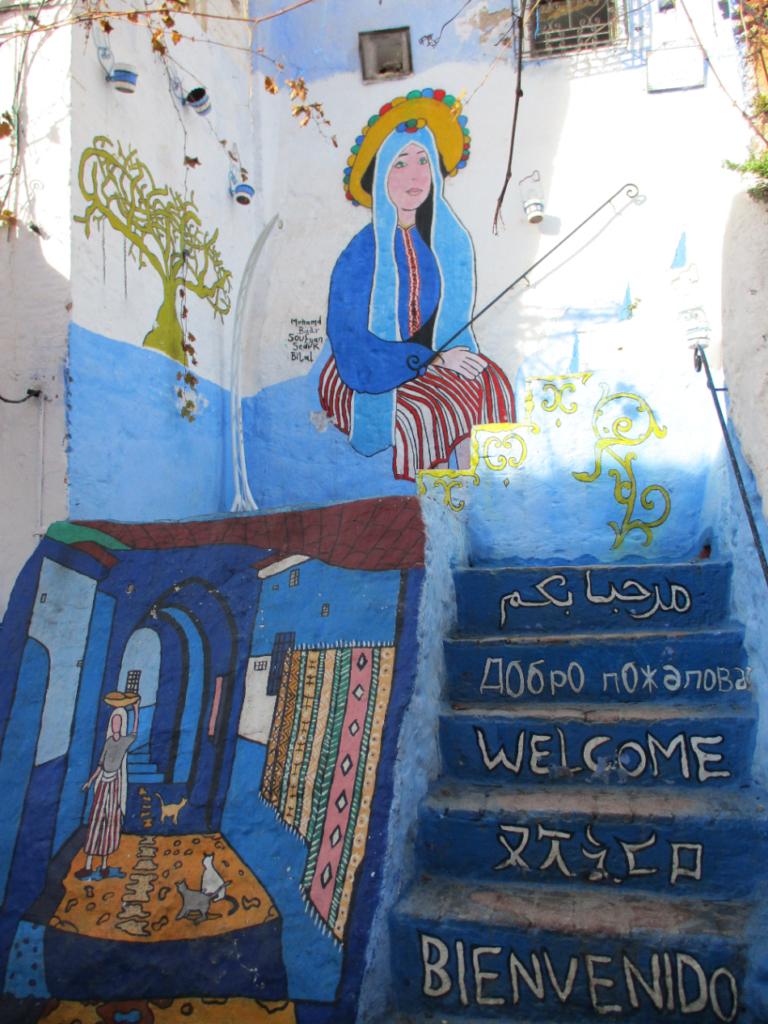
A painted staircase in Chefchaouen, showing a woman in traditional Riffian dress
The experiences I had in Morocco will stay with me for the rest of my life. The first time I heard the sunset call to prayer from the Spanish Mosque in Chefchaouen, as it echoed between the hills, the muezzins of all the other mosques in the valley resounding in turn, to the point that the stray dogs of the town would join in too, all howling together. Visiting the tiny scholars’ rooms in the oldest university in the world, the University of al-Qarawiyyin in Fez, founded in 859AD, where students had just two years to memorise the whole text of The Quran. Cycling through the argan forests outside Essaouira, camels crossing the road in front of us silhouetted against the sunset. What made me fall in love with this endlessly fascinating country was the richness of its culture, the warmth of the people, and the depth of their spirituality. As with many of the best places in the world just now, all of this is increasingly under threat from the demands of modern mass tourism.

Tourists and locals gather at the Spanish Mosque in Chefchaouen for sunset.
Morocco has one of the fastest growing tourist sectors in the world. Figures for 2023 show a 34% increase in visitor numbers from the previous year, with an estimated revenue from tourism of $9.6bn. This year, Morocco welcomed nearly one million tourists in January alone, a 10% increase on last year. Last year’s earthquake – that brought devastation to so many villages in the rural Atlas Mountains – has not stopped the government from pressing on with its $580 million plan to boost the tourism sector and attract 17.5 million tourists by 2026. Especially for those from the north seeking winter sun, Morocco has a number of obvious practical draws: year-round sunshine, easily-accessible budget flights from Europe, and prices considerably lower than in Europe, North America, or China – the latter a country from which Morocco sees more tourists every year. I spent two months in the country from December 2023 to January this year, as being of no fixed abode at present, it seemed considerably more appealing than spending the same time in a cold, wet, expensive country in the grips of an increasingly depressing political crisis. As I am trying to finish a PhD thesis, and the only employment options available to me would involve working six days a week to survive, it was by far the most sensible course of action available to me at this time.
I first visited Morocco on a day trip from Tarifa, Spain to the city of Tangier in December 2022, and was immediately bewitched. It’s only an hour from Spain on the FRS high-speed Tarifa Jet ferry, but you step off at Tangier Port into another world, a whole new sensory experience of sights, sounds and smells. Without wishing to exoticise the place, there is something undeniably intoxicating about being somewhere where so much is so different to what you know as ‘normal’; a feeling you either love or hate. I adored it. I spent much of my spare time last year plotting to return for a longer spell, encouraged by an older friend who has been visiting Morocco since the hippy trail days of the 1960s.

Cats rule in Morocco – a café in Tangier
I tried my best not to be a tourist: instead of racing around trying to tick all the usual ‘must-see’ boxes, I chose to stay for four weeks each in two smaller towns, Chefchaouen in the Rif Mountains in the north, and Essaouira on the Atlantic coast in the south; I spent my money in independent local businesses, and made an effort to avoid chains and tourist traps; stayed in hostels and travelled overland by public transport; and took the opportunity to speak with locals wherever I could. Arriving in Chefchaouen, I spent the first few days wandering the narrow blue streets of the medina, fuelled mostly by hot bowls of bisarra, Moroccan pastries, freshly-squeezed orange and pomegranate juice, and the very finest and freshest hash money can buy. In high season these days Chefchaouen is a magnet for influencers, taking selfies in its colourful, Instagram-friendly alleyways. In December it’s a decidedly more relaxed place, and people have the time to chat. A friend from the hostel and I got talking to a guy in one of the hole-in-the-wall juice shops. He told us that nothing’s cheap for locals – they’ve suffered from a cost-of-living crisis there too, and they can’t grow as much produce in the mountains any more due to the extended drought caused by climate change. This means other, more lucrative crops have come to dominate the local agricultural landscape even more than they did in the past – the Rif Mountains are one of the biggest cannabis-producing regions globally, with 800,000 people employed in an industry that supplies half the world’s hash. These days, it’s only really the hash farmers who can afford to irrigate, squeezing out other traditional agriculture. Even they still have to entertain tourists for farm tours, just to make a bit of extra money on the side.
One day a bunch of us from the hostel went to Akchour, a half-hour or so shared taxi ride up a pretty rough road to the north-east of Chefchaouen. It was a magical day out. We swam in a river pool that was as cold as the sea in Scotland, had coffee and pomegranate juice, then did a wee gorge walk up to a dramatic rock arch known as God’s Bridge, over some rather questionable wooden footbridges that barely bore the weight of one person. Our experience was greatly enriched by the company and guidance of a young local guy we made friends with called Abdullah. Abdullah moved to Chefchaouen from Meknes and was living in an under-construction building as a caretaker, trying to do whatever he could to make money, including offering his services as a guide to tourists. Youth unemployment is at about 25% in Morocco, probably higher in areas like the Rif, where traditional agriculture is on the decline. Abdullah’s English wasn’t yet accomplished enough for him to earn an official tour guide’s badge, but like anyone he needed to make money, so took his chances anyway. We had a brief confrontation with the ‘tourist police’ when we arrived at Akchour, when we had to insist Abdullah was our friend and not a guide. We were all though more than happy to compensate him for his time, given how much sheer joy he evoked over the course of the day.
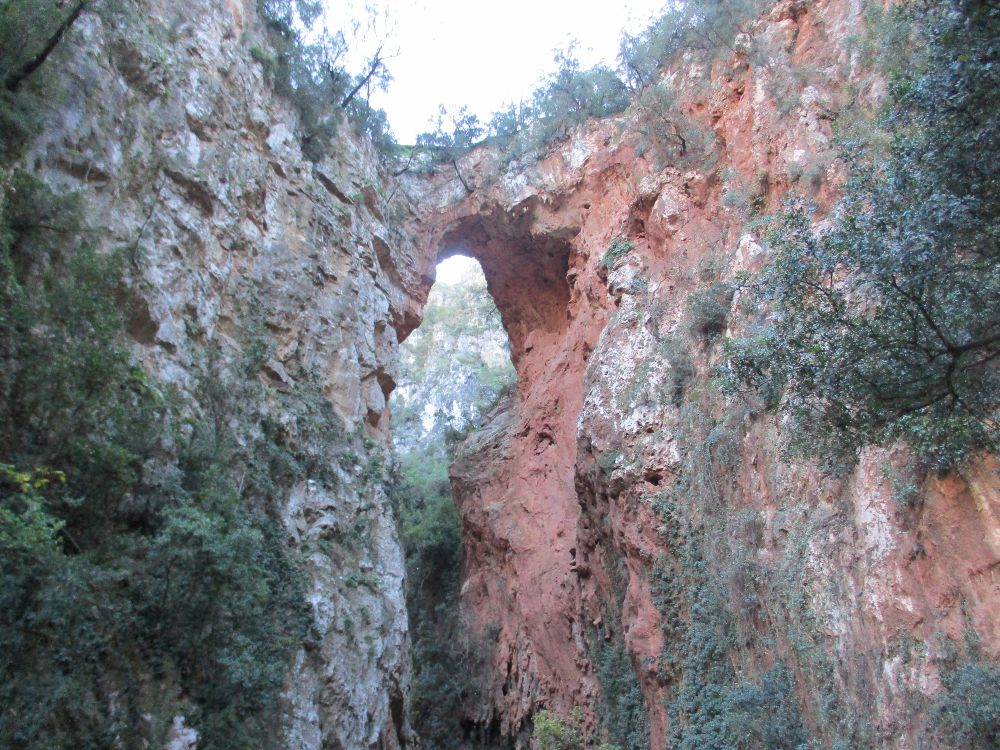
God’s Bridge, Akchour
Despite the difficulties of his situation Abdullah is one of the funniest, most energetic and upbeat people I’ve met. We had an enlightening, challenging and thought-provoking conversation over dinner in Cafe Clock that night, that cut right through my rose-tinted visitor’s view, essentially about the various socio-economic issues caused by consumer capitalism in all our countries, and about what really constitutes quality of life. Kids like him in Morocco just want to improve their language skills enough to come to Europe and have access to educational opportunities and higher wages. It doesn’t matter how much you tell them that the pay is relative and the people miserable and individualistic compared with their own, about the horrible weather and dire, expensive food – when you don’t have two beans to rub together you just want to improve your material circumstances, and if that means leaving a beautiful home and rich culture behind possibly forever, for many that’s a price they’re willing to pay. In Morocco, foreigners are forbidden by law from buying farmland, and individual families are also limited to how much they can own, so Abdullah’s family farm can’t support all his siblings. Working in hospitality at home, he would be lucky to earn much more than £400 a month – so it’s no wonder that starting a new life abroad appeals to so many young people in Morocco, with tourism being touted as the key to the country’s economic growth. I thought about that conversation a lot after, and the more I did, the further I seem to get from arriving at any conclusions.
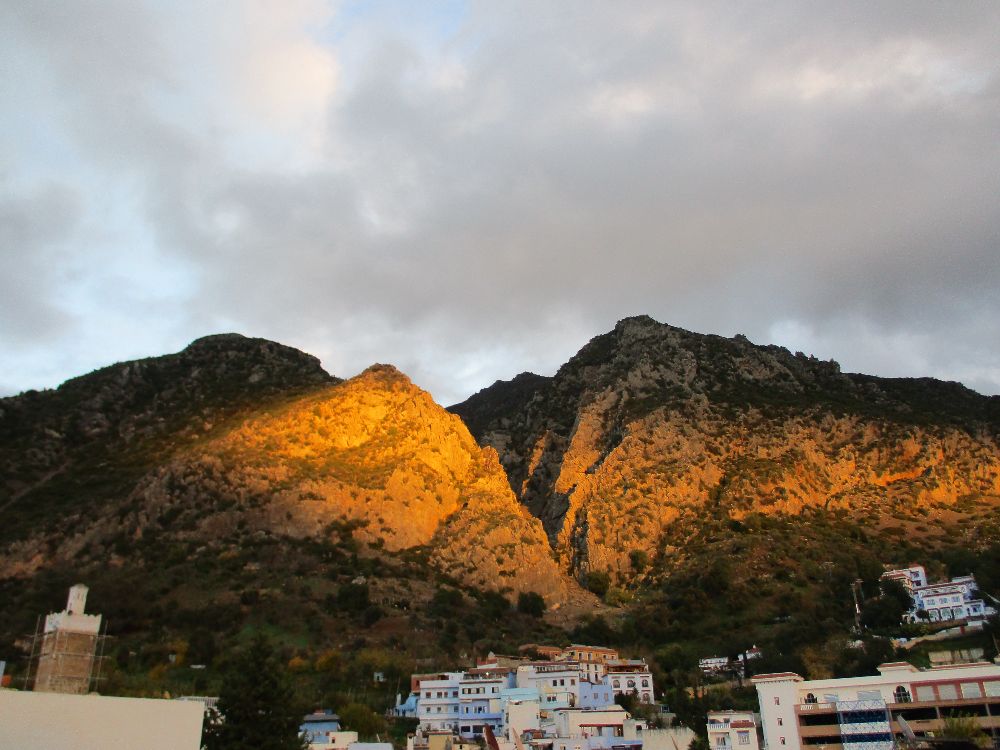
Chefchaouen – ‘look to the horns’
Later in my stay I went walking up in the hills behind Chefchaouen. The name of the town of Chefchaouen – known locally simply as ‘Chaouen’ – is from the Tamazight for ‘look to the horns’, the mountain peaks overlooking the town being thought to resemble the horns of a goat from a distance. Tamazight is the generic term for the Afroasiatic languages of the Amazigh peoples – which is how many folk around here identify these days. The outsiders’ term, ‘Berber’, comes from the same root as ‘barbarian’, so it’s understandable that they might prefer their own word, meaning ‘free people’. Riffian folk live right up into the mountains, and walking any of the trails you come across wee green hollows just like you do in the Highlands, except they aren’t just old shielings and someone will still live there. One of my favourite spots I saw was a wee farm clinging to the mountainside in the gulley behind the village, its disused terraces bearing a resemblance to the old feannagan you see in Scotland.
I stopped on a rock for a drink and to admire the view, and the man who lived in the wee house nearby came out to chat. We had a conversation in a mixture of English, French and Spanish in which we somehow understood each other perfectly. He proudly showed me his olive trees and marijuana plants, told me how much he loved living in the peace and quiet of the mountains, and invited me in for a mint tea and a joint. I politely declined and walked on, meeting some goats and a donkey along the way back down the hill.
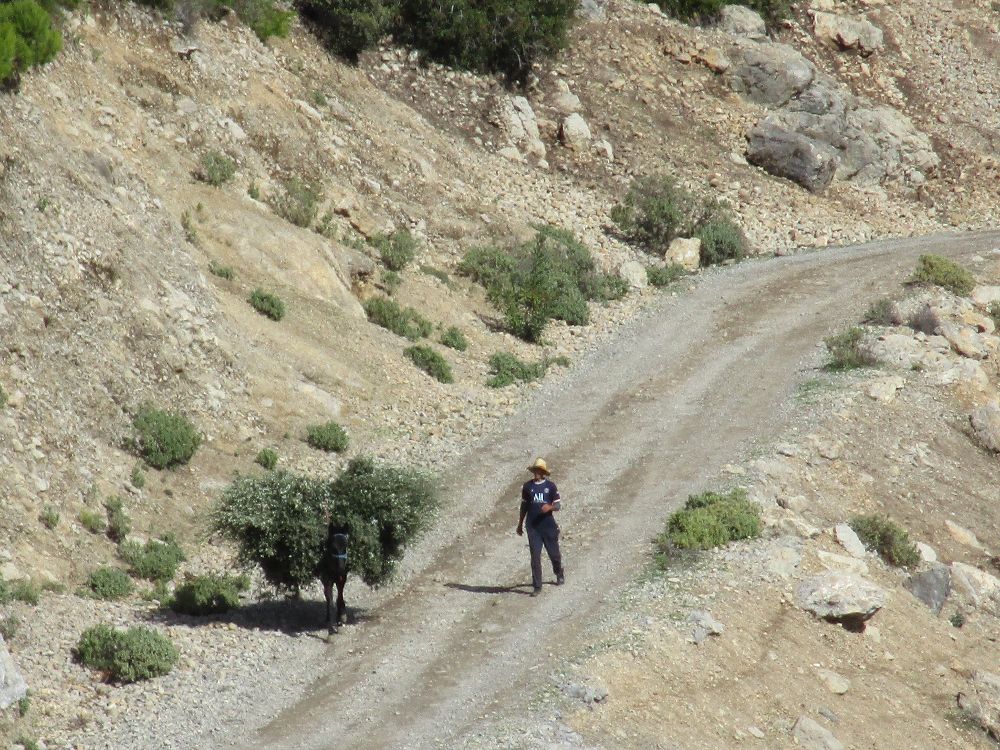
Farmer with mule
After Chefchaouen I travelled south via bus and train, spending a couple of nights each in the chaos and clamour of Fes and Marrakech. It was a relief to then arrive in the beautiful and supremely laid-back fishing town of Essaouira on the Atlantic coast, where I settled in for the month. Essaouira was famously a destination on the hippy trail, visited by Jimi Hendrix shortly before his legendary Woodstock performance, and is now every June the location of a renowned gnawa music festival. It is a dangerously languorous place, in which you could happily spend an eternity enjoying the rising and setting of the sun. The Atlantic coast around Essaouira is dotted with wee ramshackle fishing towns, some of which have in recent years become surfing destinations, and one of the best-known of which is – or perhaps was – a place called Imsouane, about 60 miles to the south.
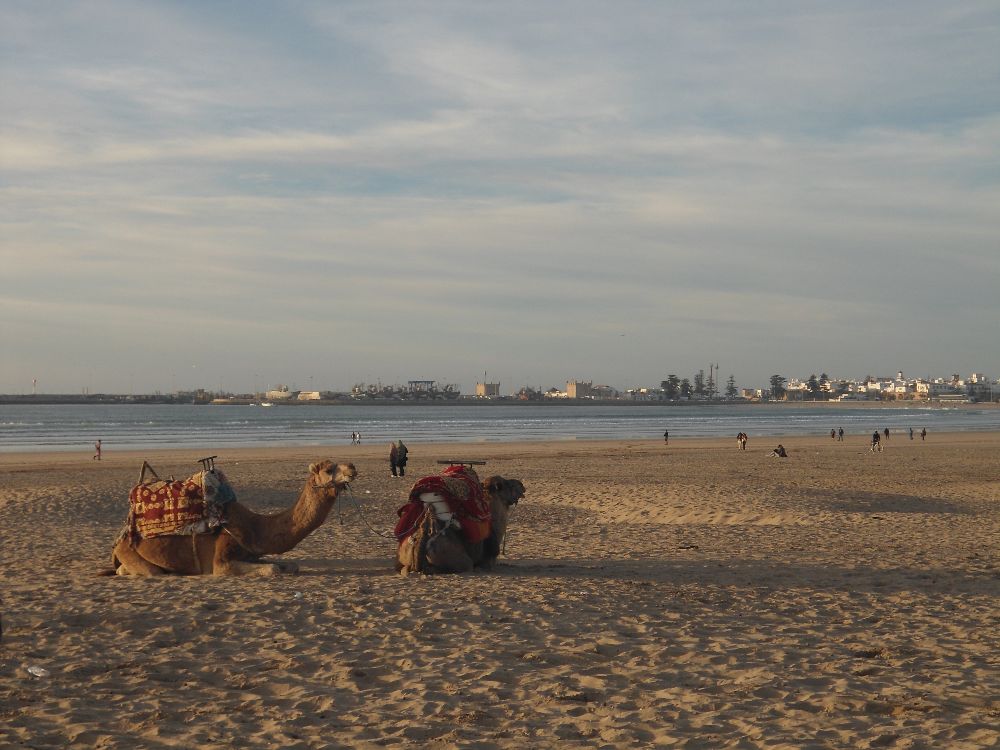
Camels chill out on the beach between rides in Essaouira
In a story that barely made it out of Morocco given everything else going on in the world, when I was in Essaouira in January the residents of Imsouane were given 24 hours to evacuate their homes, and the bulldozers came in the next day to start the demolition of much of the village. There are apparently plans for a luxury hotel development. Many of the residents built their homes without planning permission, and so having no legal rights just had to pack up their life’s possessions and leave. In the words of the hostel staff member who explained the background to the situation to me, ‘c’est catastrophe!‘. Almost an entire village was displaced for a hare-brained scheme that given its incongruity with the location will probably fail – the last thing most folk who visit Imsouane want to see there is a luxury hotel. As the hostel worker told me, if they really wanted to help the local community, they could have built a hospital or a school. The land round there though, is owned by a high-ranking government official. This is by no means the first time this has happened in Morocco in recent years, and depressingly, it certainly won’t be the last.
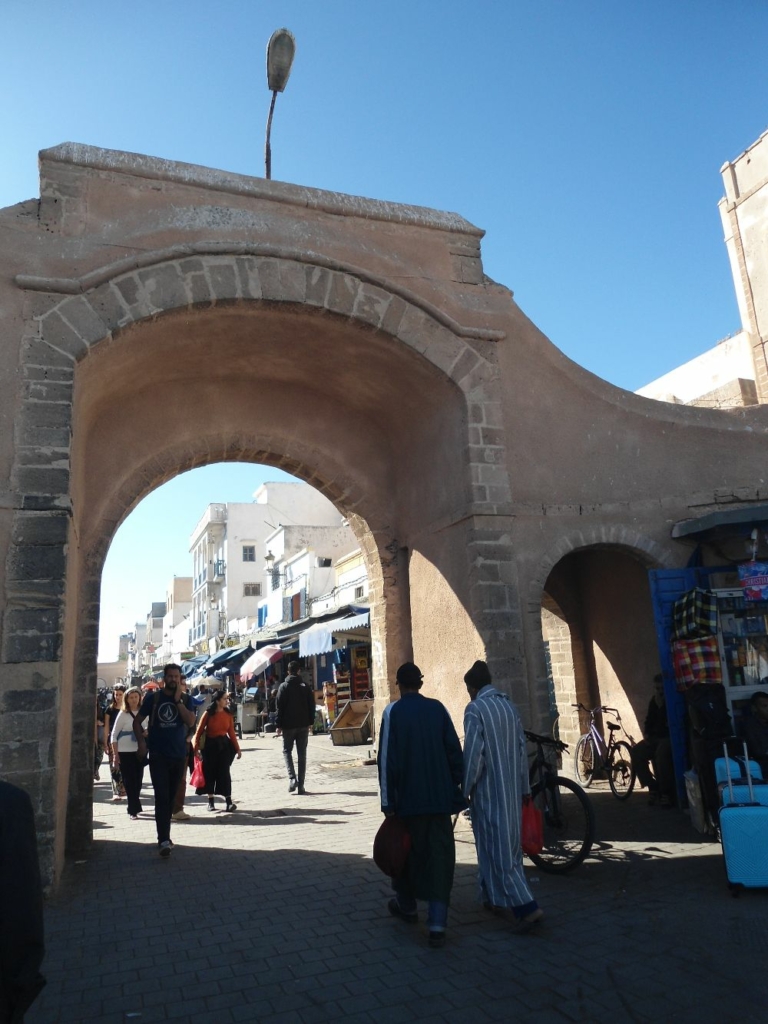
A street in the medina, in Essaouira
I moved on to Meknes for my last stop on the way back north, and was glad I left it to the end of my trip. Meknes is – only just – a normal Moroccan city that’s not yet entirely geared towards tourists. Meknes is one of Morocco’s historic imperial cities, but so far sees little tourist traffic, aside from history geeks like myself visiting to see the impressive Roman ruins at Volubilis. Having been in the country for two months by this point, having a bit of context made it all the more interesting. It’s observable how they’re pouring money into preserving the city’s heritage, but pretty much neglecting everything else. Despite being surrounded by rich farmland, you meet a lot of young people in Morocco who had to leave Meknes to find work elsewhere, like my friend Abdullah in Chefchaouen – a tale that will have resonances for many in the Scottish Highlands.
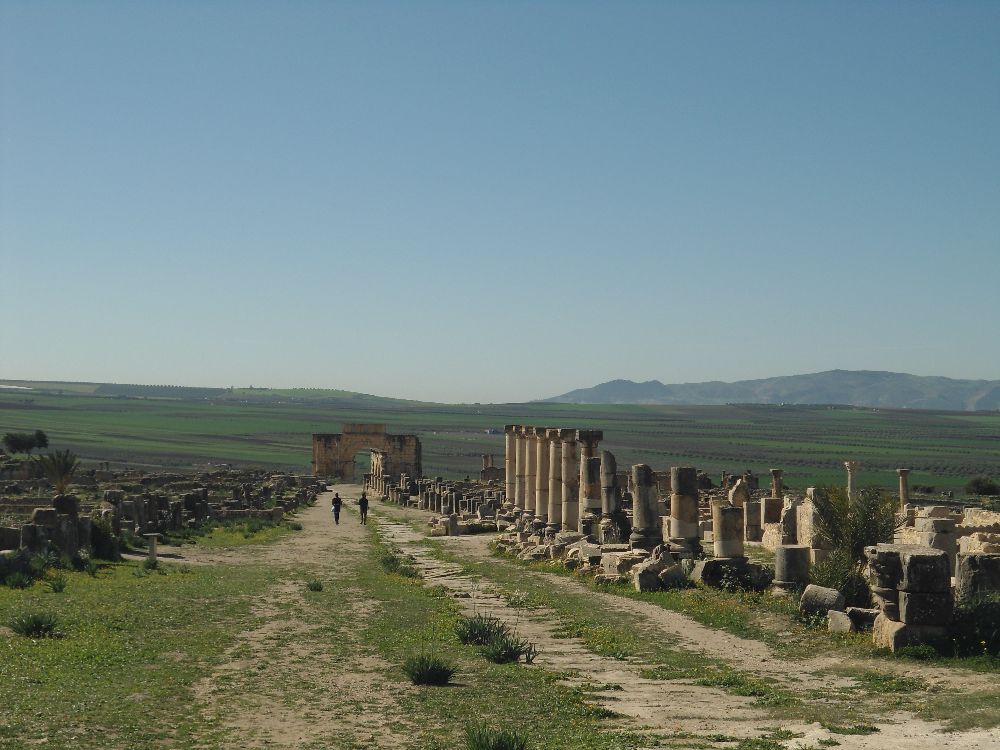
The Roman ruins at Volubilis, near the city of Meknes and town of Moulay Idriss. The surrounding countryside and farmland is so verdant it’s reminiscent of the Black Isle, on a much grander scale
I considered staying for the full 90 days the tourist visa allows, but realised that the longer I stayed in Morocco, the harder I would find it to leave. In the spring I moved on to the south of Spain, gave a talk in the north of Italy, then whiled away the last of my spare time in the Algarve, before returning to Scotland to spend the summer working in hospitality myself. Everywhere I went at every stage of this trip, I heard all the same complaints from local people regarding over-tourism, and the problems it causes in terms of access to land and housing, limited employment opportunities, and the erosion of local cultures. Everyone, everywhere is saying the same stuff. Something’s got to give.
Coming back to Europe after two months in Morocco was surreal. I expected to experience culture shock on arrival, perhaps not so on my return. Everything looked so shiny, sterile even. There were no animals all over the place. Where were all the people? And why weren’t they smiling at me? Why didn’t they want to talk to me? I hated it. I kept seeing phantom stray cats and dogs out the corner of my eye, and was disappointed every time it turned out to be a shadow.
Like so many other treasures of the world, if those currently in power get their way, Morocco will be hollowed out by ‘high-end’ tourism within 20 years, and half the young folk will have left to pursue better opportunities abroad. As one 23-year-old from Essaouira told me, ‘fuck no, I don’t want to leave Essaouira – I just wish I could pick Essaouira up and take it with me to another country’. The more worldly know already that Europe is a palace of smoke and mirrors, and are heading to Saudi, UAE, Oman and Jordan instead for work. Why wouldn’t they? Service sector workers in Morocco make about £250-500 a month. A starting off doctor gets about £800 a month. So if you find yourself being charged ‘tourist price’ in Morocco, you’re not getting ‘ripped off’ – they’re just proportionately adjusting the price to something that you can actually still afford. Pay up, and tip generously.
My experiences in Morocco taught me three main things: firstly, that there’s a lot of racist and misinformed rubbish talked about Morocco; secondly, that there are many things that we are very, very poor for in Europe; and thirdly, that the problems caused by tourism affecting our own country and particularly the Highlands are international in nature. There is a connection between people like me, who cannot afford to live comfortably year-round in the UK, who have decided that the combined effects of poverty and seasonal depression are not worth tolerating, and that if life must be difficult it might as well be difficult and interesting; people of the global south like my friend Abdullah, who must leave his family farm and home region to seek an income elsewhere; and people like the long-term guests I met in the hostels, some of whom had moved to Morocco because their pension wouldn’t keep them in their home countries. We are all living as itinerants in a real-life Nomadland, due to the sheer dysfunctionality of late-stage capitalism; our situations feeding into each other’s in a vicious circle of consumerism and displacement.
I left a big chunk of my heart in this weird, wild and wonderful country, and can’t wait to go back. To fall in love with Morocco though, is to have your heart broken; broken for the brutal struggles folk there face in life due to being governed by people whose concerns lie so far from their own. The problems of access to land and the effects of tourism become relatively peripheral issues in a country where observance of basic human rights is not always a given. In Scotland we are lucky in comparison. Solidarity with the Amazigh, Arab and other peoples of Morocco in their continuing struggles for freedom.
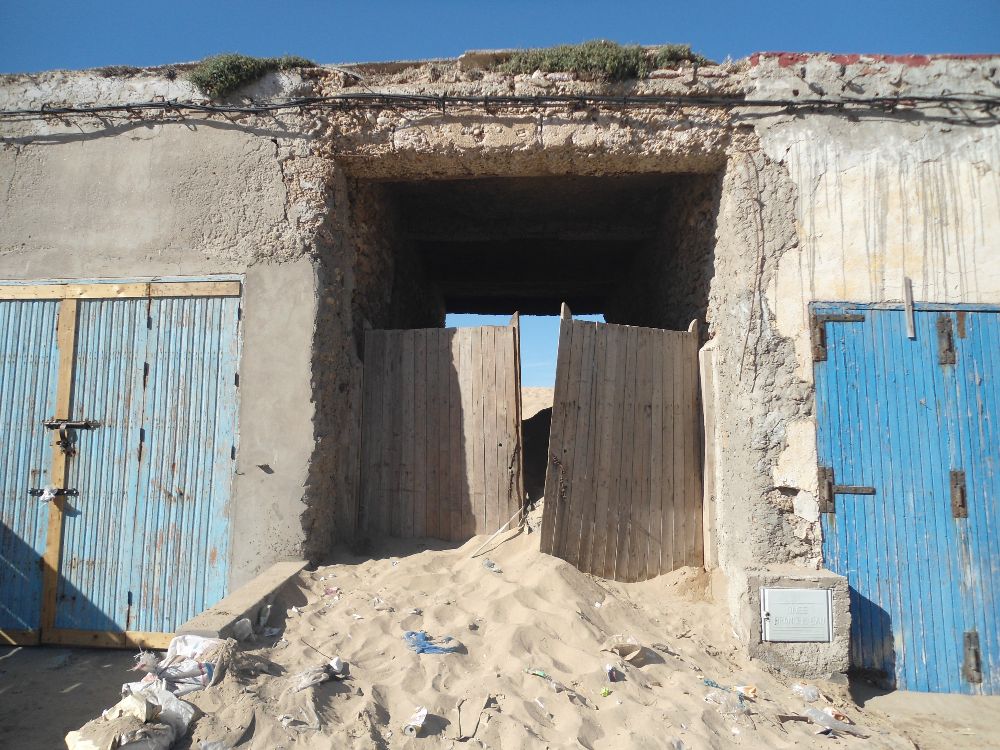
Essaouira: Sous les pavés, la plage

And solidarity with the people of Western Sahara where Morocco occupy 70% of their country.
Indeed, and as Gemma says ‘… the sheer dysfunctionality of late-stage capitalism; our situations feeding into each other’s in a vicious circle of consumerism and displacement.’
Will this be the third time Mike takes this post down:
Morocco has a horrendous human rights record. Human rights monitors, including Amnesty International, regularly report:
– intolerance towards free speech
– repression of dissent
– torture and other ill-treatment
– entrenched gender inequality, especially in relation to inheritance and child custody laws
– punitive punishment of adult same-sex sexual conduct or ‘unnatural’ acts
– judicial murder of migrants from sub-Saharan Africa and through the application of the death penalty to some criminal acts
– inequalities in access to water
The Free People of Morocco, my *rs*!
You don’t see that there’s a difference between a monarchist dictatorship and the ordinary people of a country who face an indefinite jail sentence for even criticising them?
Of course there’s a difference; but there’s still no need to patronise ‘the ordinary people’, with their ‘warmth’, ‘richness of culture’, and ‘depth of spirituality’, as the salt of the earth. I’m sure they get their fill of that from the travel brochures.
I went away travelling because I’m 45, I have no ties, I’m still trying to study my way out of a lifetime of hospitality work, and you only get one shot at this life shit so you might as well make it interesting instead of pulling pints or cleaning toilets in the cold and dark all winter. I wrote the article as I heard a lot of racist rubbish spoken about Morocco before I went and wanted to counter some common misconceptions with my generally positive experience and some contextual background. If you want to make any other reading of any of this that’s entirely up to you. Goodnight
‘People like me who can’t comfortably afford to live in the UK’.
Millions of people can’t afford to live ‘comfortably’ in the UK, very few can afford to go to Morroco for 2 months, followed by Southern Spain, Northern Italy and finally the Algarve.
If you want to prevent mass tourism to Morocco don’t write articles telling what a great time you had. Just a thought!
Yep; my heart bleeds!
I don’t owe you receipts John, but for the record I’ve been technically homeless since March 2023, and my life’s possessions are in a storage unit that costs me £70 a month. I spent a grand total of £4000 over four months travelling in the winter, earned working 50 hours a week in a live-in hotel job for two months last summer. For 75% of that four months I stayed in shared hostel dorms, and travelled mostly by bus.
The same amount would not have kept me in a one-bed flat anywhere in Scotland for the same period. I chose to do so because I have academic work to complete in whatever spare time I can get. If I worked full-time and rented a flat here the hours I’d have to work would mean I’d have no opportunity to get the time off to complete my PhD thesis. Crazy world we live in hey?
I do apologise for my imaginative use of my limited resources, but I’m pretty sure you’d rather have your house, car, etc., wouldn’t you? I shall endeavour in future to be both poor *and* miserable so as not to upset you further.
You do come over in your article as rather ‘entitled’, Gemma.
Cheers
Truly the concept of ‘the deserving poor’ is embedded in the British psyche. Back down the mines with me
I found the following passage particularly expressive of a sense of entitlement.
‘I spent two months in the country from December 2023 to January this year, as being of no fixed abode at present, it seemed considerably more appealing than spending the same time in a cold, wet, expensive country in the grips of an increasingly depressing political crisis. As I am trying to finish a PhD thesis, and the only employment options available to me would involve working six days a week to survive, it was by far the most sensible course of action available to me at this time…’
Not everyone has the opportunity to escape ‘a cold, wet, expensive country in the grips of an increasingly depressing political crisis’ by buggering off on the old hippy trail to Morocco for a couple of months, to finish writing their doctoral thesis among the quaint people of that endlessly fascinating country, with their warmth, richness of culture, and deep spirituality. I can see how less entitled people, who have no choice but to work six days a week to survive, without the option and reward of a postgraduate education, and who experience real precarity in their lives, could readily identify with your predicament.
If you continue ad hominem attacks on our writers you will be removed, again. A period of quiet reflection would be a great idea.
What a bitter and cynical misreading of the article, based on a whole suite of unevidenced assumptions. As someone who has spent most of their adult life – and continues to do so for 40 hours a week on minimum wage – clearing up after people like you: serving your drinks, washing your dishes, cleaning your toilets and changing your beds, you can frankly go and fuck yourself
Tee hee, great repost.
I great read Gemma – I found the ruminations and descriptions very engaging. I have never been to Morocco but you speak really well of the place and paint a great picture. I like a bit of Moroccan 😉
Comments have been very harsh here, though I was bit less keen on the political pontifications in the piece as it is a bit confused and some of the comparisons a bit forced.
One other thing – ‘awful weather’ – never understood why people dislike cold and rain so much as I regard this as good weather and endless heat and sun the opposite (and what about that drought?). I bet some in Morocco wouldn’t mind a bit more cold and rain.
What is your PhD in btw?
Hi Niemand. I apologise if my direct response offended anyone, but I’m not being told I’m ‘entitled’ for thinking outside the box to make the best of a shit situation by a retired professional with a country home and a vegetable garden he’s always telling us about. Think I heard, ‘something something avocado toast, something something…’
Curiously neither of the complainers here had anything to say when I wrote about bumming about in the Highlands ‘patronising’ Gaels on the taxpayer’s dollar for uni, so judging by both of their extensive comment histories, I do wonder what it was that riled them about me doing the same on my own earnings in Morocco, and writing a positive account of another culture and religion… We’ll leave that as a rhetorical question, shall we?
Thanks for your more constructive criticism. I hope I didn’t ‘pontificate politically’ – I tried not to as I don’t have the knowledge base. What I was trying to comment on, however clumsily, was something that I do know a lot about, and that’s tourism and the hospitality industry. I went to Morocco trying to lean into the uncertainty of precarity for once, having spent too long trying to make an impossible situation work in my 25+ years in hospitality, and subsequently meeting the sharp end of academic precarity. I was humbled by the triviality of our problems compared with the issues people face there, but also struck at the connections and similarities with issues of land, housing, employment and community here at home. Again and again, in Morocco and elsewhere, I found myself having exactly the same conversations I do with young pals in the Highlands. It was these connections I was trying to highlight in solidarity with those I met abroad.
My PhD is on place-names as a source for historical transhumant practice in North West Sutherland, and the place of the shieling in Gaelic culture, ecology and ontology. I hope to be done in the autumn, after which my culture warrior fanclub will be delighted to hear, I’ll be returning to Morocco on the lavish riches I’ve amassed changing beds in a hostel all summer. Slàinte!
I should have realised you wrote those pieces about the Highlands. They are some of the best things I have read on here. I hope we can expect more; your work is very interesting and you write really well.
What this piece reveals is the serious complexity of the issues discussed, not least tourism.
Quite right Gemma, your Calvinistic critics are talking shite. ‘Entitled’ for travelling abroad? Some folk just hate woman differentiating themselves from doormats, so an independent working class woman travelling (!) and writing (!) about her experience is going to push their buttons big time. Great article btw, good luck with the writing and travel.
Indeed, a really interesting article and looking at the world that’s as far aware from the online argument factory that twitter and internet comment sections can sadly be full of.
Good luck to you Gemma, all your articles are wonderful and contain very useful information. Good luck with your research and all your studies.
SBIHI Yassir.